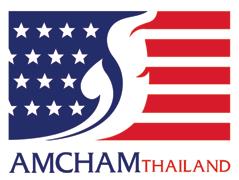September 2023
T-AB
INSIDE THIS ISSUE:
ROUNDTABLE MEETING WITH SENATOR TAMMY DUCKWORTH
STUDENT’S STORY : MEET APINYA (EVE) PABAO
LEADERS NAVIGATING AN UNCERTAIN WORLD

IN THE SPOTLIGHT : SUCHINTANA VIRARATT

FOR THE LOVE OF thriving,




it’s only human to power a brighter future

We believe that the future of energy lies in reducing carbon emissions and mitigating greenhouse gases, thereby ensuring a sustainable and resilient world in all aspects.
Chevron Thailand Exploration and Production Limited is committed to advancing technology in reducing greenhouse gas emissions from operations while enhancing the utilization of renewable energy in our production processes to support Thailand's carbon neutrality target by 2050 and net-zero emissions by 2065.

PRESIDENT
Ornkanya (Mook) Pibuldham, Bank of America N.A.
VICE PRESIDENTS
Arpaporn (Gift) Samabhandhu, Johnson & Johnson
Deborah Seifert, Pfizer

John Evans, Tractus

TREASURER
Kaveepan Eiamsakulrat, The K.E. Group
SECRETARY
Eliot Delunas, Nitro Labs
GOVERNORS
Wiyada Srinaganand, 3M
Jamie Brennan, Amazon Global Selling
Chatit Huayhongtong, Chevron
Tanapot Parksuwan, Citibank N.A.
Simon Denye, Harmless Harvest
Rachel Davidson, Hilton & DoubleTree Sukhumvit Bangkok
Charles Blocker, IC Partners
Aileen Chew, Mastercard
Piangruetai Sivaratana, Seagate Technology
BOARD ADVISORS
David Lyman, Tilleke & Gibbins
AMCHAM President in 1975, 1986
EXECUTIVE DIRECTOR
Heidi Gallant
Dear Members, September is in full swing. Next week, we are meeting members out on the green at our sold-out ChariTee Golf Tournament. We hope that you will join us to meet our 2024/5 Board Candidates the following week at our Member Luncheon, and our joint AMCHAM

& BCCT Young Professional Committees on AI and the Next Generation of Leaders on October 10. Please keep an eye on our calendar which is packed as always with council meetings, committee events and our member Insight Exchange and ABT calls.
With the formation of the new government, our Government Affairs team has been reaching out to congratulate the incoming officials and continue progress and dialogue on issues important to our members.
September is also new member referral season. AMCHAM has experienced a record year of new member growth in 2023, primarily due to enthusiastic member referrals from our community. We welcome you to invite one guest free of charge to an upcoming Member Luncheon to experience our offering for themselves. To take advantage of this offer, please let our membership team know your guest’s name and company – once they’ve verified their eligibility for membership, they will register your guest gratis.
We are now accepting membership applications for 2024. New members will have their membership activated once the membership application process complete, allowing them to access member privileges for the remainder of 2023 for free. This is an excellent time to connect with your associates and encourage them to investigate what an AMCHAM membership can do for their business. We look forward to expanding our network with you!
Aphirak Klayna
Sincerely,
Heidi Gallant Executive Director AMCHAM BOARD OF GOVERNORS 2023
Leaders Navigating an Uncertain World
 By Derek Keswakaroon and David Michels, Bain & Company
By Derek Keswakaroon and David Michels, Bain & Company
How executives can lead through today’s “polycrisis” of geopolitical and macroeconomic pressures.
Business leaders across the globe are regularly asking themselves some form of the following four questions:
1. How do I navigate today’s environment of extraordinary uncertainty?
2. How probable are inflation and recession in major markets?
3. What potential scenarios should I therefore be planning for?
4. Amidst all this uncertainty, what are long-term themes and opportunities I should invest in?
As the pre-pandemic world recedes executives are left to navigate what some are labeling a “polycrisis”—a collection of smaller crises, both
geopolitical and macroeconomic, that together exceed the sum of their individual parts. Covid. Supply chain insecurity. War in Europe. Energy transition. Diminished consumer and business confidence. Trying to untangle the impact of any one of them is akin to extracting ingredients from a fully baked cake.
In an era of such profound uncertainty, focusing solely on a single high-probability scenario is a mistake. The key lies in having options, which necessitates contemplating a wide spectrum of scenarios, including those that are extreme yet plausible. Prediction, adaptation, and resilience are all required.
Economically, momentum has waned. China recently adjusted its Gross Domestic Product (GDP) growth target for 2023 to 5%, below last year’s target and significantly below historical growth rates. In the US, the Purchasing Managers’ Index (PMI) only recently saw a slight uptick after
steadily declining for over a year. Dips in the PMI often foreshadow declines in profitability, followed by decreases in employment. (And then, voilà: a recession.)
In terms of inflation, the consumer price indexes in the US and the eurozone rose consistently for two years before beginning to slowly decline. Year-over-year increases for February remain elevated at 6.0% (US) and 8.5% (EU). Although inflation seems to have tapered off in recent months, the European Central Bank and the Federal Reserve have been unequivocal about their intention to stabilize inflation at around 2%, and we are not there yet.
When the Federal Reserve raises rates, the outcome tends to be unfavorable. Domestically, companies vulnerable to interest rate fluctuations may face balance sheet challenges. (Remember the 2007 subprime crisis?) On a global scale, higher rates strain economies that must purchase food and fuel in dollars on the global market. Governments that borrowed when the dollar was weaker may struggle to repay. (Remember the Asian financial crisis of 1997?)
So, where does this leave executives? There are four divergent scenarios worth their consideration:


• A “perfect landing,” where central banks increase interest rates just enough to halt inflation, demand remains strong, and inflation lingers close to the 2% target
• A “normal recession” lasting two to three quarters, where consumers spend less but central banks avoid more drastic rate hikes.
• A “financial crisis” brought about by central banks tightening rates slightly too much or for too long, eventually impacting both markets and high-income earners significantly and resulting in a stronger dollar that puts pressure on emerging markets struggling to repay debts.
• “Stagflation” triggered by delayed action on interest rates or, for example, spill-over effects from the war in Ukraine, coupled with diminished consumer confidence and spending power. This will particularly hit moderate-income earners especially hard if wages continue to lag.
For executives, the implications of these scenarios will often differ by region and by industry. What is crucial is to strategize how their business and organization could respond to each scenario. Equally important is to consider what actions can be taken now to integrate flexibility and resilience, to better adapt and withstand unforeseen changes.
Amidst this uncertainty, it is also vital to have a clear understanding of significant, multiyear geopolitical and macroeconomic trends and how these will unfold in each of the above scenarios. This awareness will present market opportunities for organizations that are able to pivot accordingly.

One significant trend is the shift towards a postglobal world, wherein national geopolitical interests take precedence over national economic and business interests. In a post-global world, governments are likely to play a more substantial role in determining economic winners and losers. Trade, capital mobility, and talent flow will all be curtailed. This transformation occurs against the backdrop of another significant trend: the demographic decline in the workforce, which seems destined to drive increased automation and reshoring.
The world is becoming increasingly multipolar, with different blocs operating under contrasting terms. The Chinese bloc is characterized by its foreign policy of a “community of shared interests”, while the US bloc, according to

The evolution of these blocs is already shaping the business strategies of global companies in profound ways. While there is no crystal ball, it is essential for business leaders to understand the geopolitical and macroeconomic context in which they operate. During times of extraordinary uncertainty, the slow and conservative will struggle while the nimble will thrive.



Effective Loss Mitigation in Manufacturing Facilities After Fires
By John Shanahan, BELFOR ThailandIntroduction
Complex machinery and equipment, flammable production materials, chemical processes, and poor preventive maintenance, are just a few of the reasons manufacturing facilities are susceptible to the potential for fire incidents to occur. This article provides an overview of loss mitigation, why it is important, and how machinery and equipment is stabilized following fire incidents in a manufacturing facility.
What is Loss Mitigation and Why is it Important?
Damage does NOT cease once a fire is extinguished. Fire incidents in a manufacturing facility can result in rapid corrosion/deterioration of precision machinery and electronics, even if they are located far from the fire’s origin. Loss mitigation is a proactive process implemented after a fire incident to prevent further damage to
property, reduce recovery time, and save recovery costs. In the context of a manufacturing facility, it involves actions to reduce overall contamination levels, prevent the onset of corrosion (by protecting surfaces from oxygen exposure or reducing airborne electrolyte) and maintaining optimal preservation conditions. By stabilizing affected property in this way, interested parties areafforded time to consider all possible reinstatement options. Rapid loss mitigation measures implemented within 72 hours of a fire incident can prevent superficial corrosion from escalating into more detrimental pitting corrosion, which may threaten the accuracy of precision components.
Until equipment undergoes professional decontamination, it is strongly recommended that affected property should not be reenergized for testing, either by the insured party or the manufacturer. The presence of latent

moisture (water applied during fire suppression), or soot contamination on electrical/electronic components, could lead to a short circuit condition or intermittent faults during operation, given the conductive nature of the contaminants. What are some actions that manufacturing facilities can undertake after a fire incident?
Prioritizing Health & Safety
The health and safety of personnel should always be a priority. A comprehensive safety analysis/ assessment should be undertaken to ensure that areas affected by a fire incident are safe to enter prior to implementing Loss Mitigation measures, and appropriate Personal Protective Equipment (PPE) should be provided and worn by all personnel.
Recognizing the Threat
Corrosion of exposed metallic components occurs due to the release of hydrogen chloride gas, as Polyvinyl Chloride (PVC) materials (commonly found in manufacturing facilities) are subject to heat or consumed by fire. The presence of water or high humidity exacerbates the corrosive process by enabling soot and chloride ions to react with exposed metallic surfaces.
Four elements are required for the onset of corrosion to occur:


1. An exposed metallic surface (unpainted/ uncoated)
2. A source of contamination (soot and/or chloride ions)
3. Oxygen from the ambient atmosphere
4. An electrolyte (water or high humidity)
The onset of corrosion may begin within hours of a fire incident and will be clearly recognizable, as bright orange ‘superficial corrosion’ develops on unprotected surfaces.
Pitting Corrosion
Pitting corrosion, commonly referred to as ‘pitting’, is a highly localized and aggressive form of corrosion, often observed on exposed precision components after fire incidents. Small areas of the metal corrode preferentially, forming pits, while the rest of the surface remains virtually untouched. Visually, pitting is characterized by one or multiple small cavities or holes on the surface of the metal. Pits can take on several shapes and sizes, ranging from deep and narrow to shallow, and wide, or undercut below the surface, and may affect the micron precision of manufacturing equipment.
An image showing the electrochemical mechanism and a microscopic image of pitting corrosion are provided below.

Benefits of Swift Loss Mitigation
The key benefits of implementing loss mitigation measures within 72 hours of a fire incident are as follows:
1. Preservation of Recovery Options: Acting promptly safeguards the possibility for
comprehensive decontamination and recovery of equipment. Loss mitigation provides the insured and interested parties with potential recovery options and the flexibility to choose the most suitable course of action for their unique situation.
2. Maintenance of Salvage Value: Loss mitigation also preserves the salvage value of equipment if interested parties decide that replacement is preferred. Insurers often sell affected property as salvage to recover a portion of the losses paid against the claim, and loss mitigation maximizes this return.

3. Compliance with Insurance Policies: Insured parties can demonstrate they have taken reasonable steps to prevent further damage, a requirement in most insurance policies. Insurance companies typically endorse and agree with the implementation ofpractical loss mitigation measures’, as such
the costs are usually claimable, barring any exceptions.
Key Takeaways:
• Rapid implementation of loss mitigation measures within the first 72 hours reduces damage and recovery costs.
• Rapid commencement of recovery efforts minimizes disruption and safeguards competitiveness.
• Solely depending on insurance settlements might not adequately address all post-disaster challenges.
• An immediate response builds trust, enhancing the company’s reputation.
• Resilience and preparedness are crucial for achieving long-term business success.
John Shanahan is the Country Manager for BELFOR in Thailand. Supporting the Thai Insurance Industry and the recovery and reinstatement of valued manufacturing customers since 2011.











BEPS Pillar 2 and the New BOI Incentives
By Till Morstadt, Lorenz & Partners BangkokIntroduction
On May 16, 2023, Thailand’s Board of Investment (BOI) issued its Announcement No. 1/2566 on Investment Promotion Measures to Mitigate the Impact of the Global Minimum Tax Regime. According to this announcement, companies with a combined annual sales exceeding 28 billion baht (currently approximately 800 million US dollars) that may be affected by the global minimum tax under the BEPS Pillar 2 project of the Organization for Economic Co-operation and Development (OECD) may choose between the old incentive catalogue and a new, more tailored one.
The BEPS Pillar 2 project aims to eliminate tax shelters, consequently requiring a minimum tax of 15% on corporate profits. If, in a particular country, taxes fall below this threshold, the (ultimate) parent entity has the right to apply a supplementary tax to reach the stipulated 15% minimum.

The aim of the new measures is to mitigate or at least minimize any potential impact arising from implementation of Pillar 2 on Thailand’s existing Thai tax incentive programs, while also preserving the country’s appeal as an investment destination for multinational companies.
Details of the New Measures
Companies with existing BOI promotion as well as new BOI applicants that demonstrate consolidated group annual sales of at least 28 billion baht (currently approximately 800 million US dollars) or fall within the scope of a country-bycountry reporting, meet the eligibility criteria. The applicant must meet the fundamental qualifications eligible for BOI promotion in principle or currently receive BOI promotion. In the latter scenario, the applicant must continue to be fully exempt from corporate income tax for at least one year, without exceeding the cumulative ceiling for corporate income tax
exemption (typically equivalent to the net investment amount).
The investment incentive measure essentially consists of the option to receive a 50% reduction in corporate income tax for twice the remaining duration of the project’s tax incentive period, capped at a maximum of 10 years. This option replaces the earlier granted or remaining corporate income tax exemption.
The details are outlined below:
New BOI Applicants
• Option to choose between “tax exemption scheme”, which follows the standard tax exemption period, depending on the BOI activity type) with the flexibility to move to tax reduction at a later date or “tax reduction scheme” (twice as long as the standard incentive period, with a maximum limit of 10 years, in either case commencing from the date on which the first revenue is generated).
Existing BOI-Promoted Companies
• Option to transition from the current tax exemption structure to a 50% reduction in the standard corporate income tax rate, currently resulting in reduced corporate income tax rate of 10%.

• Duration: Twice the remaining full-year eligibility period, up to a maximum of 10 years, commencing from the date of generating revenue subsequent to receiving the new BOI certificate.
• Other rights and incentives remain unchanged.
Conclusion
For multinational companies with existing BOI promotion and/or those planning to apply for new BOI promotion, the initial step involves verifying the eligibility for this option. If this is the case, it should be examined to see which of the promotion schemes makes more sense in the long term from a business perspective. Particularly in the case of sharply rising profits toward the end of the promotion period, it may make sense - quite independently of other considerations - to implement the new model for purely arithmetical reasons.
Furthermore, it is recommended to assess the implications of implementing the Pillar-2 regulations on investments in Thailand. If this assessment indicates that the effective tax rate for the company in Thailand might dip below 15% and that additional taxes are likely under Pillar 2, the resulting consequences should also factor into the calculation to determine the preferable scheme and, if necessary, the optimal time to transition from the old support scheme to the new one.
Till Morstadt has been an equity partner of Lorenz & Partners since April 2004. He publishes articles and holds seminars on investment, tax and law related issues in Thailand and Southeast Asia on a regular basis.

Navigating the Crisis: Legal Obligations of Employers under Thai Employment Law
By Thanyaluck Thongrompo, Sirapat Chaisarnseri, Napas Udomratanasirichai, Kudun & PartnersThe epidemic has disrupted livelihoods and social protections on a global scale, while at the same time accelerating pre-existing trends in the employment sector, notably the adoption of hybrid work arrangements. As a result, businesses have been faced with unprecedented and lasting challenges in structuring workforce arrangements. While transitioning to this postpandemic economy, the workforce remains consistently vulnerable to inequitable treatments and misconduct, underscoring the critical roles of employers in fostering workforce resilience during this era.
This article discusses the obligations of employers in the private sector under the primary legal framework of Thai labor law – the Labor Protection Act B.E. 2541 (1998) (LPA). It highlights the fundamental roles that employers assume during times of crisis, while also examining recent
regulations that deal with the growing trend of remote employment.

Fundamental Compliance with Thai Labor Law
Financial stability and individual well-being emerge as crucial aspects during times of crisis. The LPA establishes core compliance standards, imposing upon employers an unwavering legal duty to ensure prompt payment of wages and other compensations at least once a month, unless otherwise agreed upon for the benefit of employees , regardless of any business-related financial challenges. Furthermore, despite a decrease in the unemployment rate to prepandemic levels in Quarter 1 2023 , certain industries, including e-commerce and technology, faced significant post-crisis declines and have been forced to carry out layoffs. In such cases, employers are required to follow provisions
regarding employment termination as outlined in the LPA. This involves giving notice of termination for a period of at least one wage payment interval and providing severance pay to employees who have worked for a minimum of 120 days (except in cases of extraordinary circumstances, such as termination due to dishonesty or refuse to follow employer’s lawful directives ). This legal mechanism has been designed with the goal of assisting employees in finding alternative job opportunities, while mitigating the potential adversities associated with job loss.
In addition, the LPA imposes the provision of paid leave as a fundamental right for employees to safeguard employees’ health and well-being while enhancing overall job satisfaction and fostering talent retention, especially amid the postpandemic “quiet quitting” culture. The LPA sets a baseline for paid time off, including sick leave of at least 30 days per year , annual leave of at least 6 days per year , and observance of at least 13 public holidays per year .
While the LPA outlines minimum requirements regarding employee benefits and welfare, employers have the discretion to provide additional considerations, such as health and medical insurance, and extended paid leaves. Alternative Workforce Arrangement


As certain groups of the workforce have been seeking increased flexibility and control over their work schedules in the post- pandemic era, many employers have introduced alternative work arrangements, including remote work provisions and hybrid work cultures. To align with this recent shift in corporate norms, the Ministry of Labor has recently pushed forward the amendment to the LPA, effective as of April 18, 2023, aimed at addressing the rights and responsibilities of parties within employment contracts that encompass remote work conditions. This amendment grants remote employees’ rights equivalent to those of on-site employees. Any remote employment agreements must comply with the following requirements:
1. The agreement must be documented in writing or electronic forms where the intended meaning is unalterable.
2. The agreement must encompass conditions such as.
a. the designated remote work period.
b. working hours, workdays, break times, overtime policies, and entitlements to leaves.
c. the scope of employees’ responsibilities.
LEGAL UPDATES
d. Employer controls and supervision.
e. responsibilities regarding the provision of tools, equipment, and arrangement of any necessary costs which may arise during the course of work.
This regulation not only addresses regulations regarding workhours in remote work scenarios but also establishes legal rights for employees to decline any communications through any means with employers, supervisors, inspectors, or evaluators outside of working hours, unless the employee has previously agreed otherwise in writing.
Final Thoughts
The commitment of businesses to uphold legal obligations while adapting to evolving circumstances stands as a promising cornerstone of workforce resiliency, given their pivotal roles in cultivating an equitable work environment. This mutually beneficial relationship underscores the importance for employers to meet their legal obligations, not only to mitigate potential legal risks and damage to reputation but also to prioritize the well-being of their employees. When addressing the lasting impacts of the epidemic on employer-employee relationships, this approach provides a strategic path that contributes to a stronger workforce and the long-term sustainability of businesses in an ever-changing professional landscape for yearsahead.
Thanyaluck Thongrompo has over 18 years of experience in assisting both local and international clients, dealing with licenses, permits, and contracts associated with IEAT and BOI incentives.
Sirapat Chaisarnseri has over seven years of legal experience, delivering corporate and commercial services to both Thai and foreign investors across a range of areas, including investment promotion, licenses, and permissions for industrial zones.


Napas Udomratanasirichai is an associate with experience in providing legal services to domestic and international clients in diverse industries, including telecommunications, financial services, renewable energy, and more.














What made you volunteer for a committee leadership role at AMCHAM?
It was an opportunity to share knowledge and experiences in what can be a fragmented space. Many businesses are trying to forge their own path, which can be challenging. I wanted to bring greater synergy to AMCHAM stakeholders when it comes to ESG. While we all have different goals, there are always benefits to collaboration.
Additionally, I hoped my insights could add value to the Committee. In addition to working in environmental management for 15 years,
I am on the Thai Listed Companies Association ESG Network Committee and the Sustainable Development Steering Committee – Circular Economy of INSEE Group.

In Thailand’s context, how do you see the role of ESG in enhancing long-term business resilience?
ESG is, in many ways, about making companies operating in Thailand futureproof. Environmentally responsible and socially conscious businesses with strong governance are the ones that have best avoided disruption in recent times. That will not change moving forward.
It should be added that transparent communication and high-quality reporting on ESG performance are becoming increasingly important in the eyes of stakeholders. Simply put, firms will find it increasingly difficult to operate without measurable ESG goals in place.
Describe your most memorable experience of being a Committee Co-Chair.
I have made some great memories during my time as Co-Chair. Something that stands out is having the ability to serve as a liaison that connects AMCHAM members with other stakeholders as this allows us to build our ESG networks. Additionally, I would like to mention the rewarding experiences of exploring new topics like carbon tax and environmental regulations.




Meet Apinya (Eve) Pabao
Apinya is a recipient of the AMCHAM Thailand Foundation’s Student Scholarship program, which provides scholarships for exceptional underserved students. Since 1976, AMCHAM continues to invest in the future of Thailand by providing scholarships and helping these students build a better career.



“I appreciate, and I am sincerely thankful that AMCHAM realizes how important the opportunity of an education can be. Giving this opportunity to someone is like giving them a new world where they can run their life and pursue their dreams, just like mine. It has been incredibly helpful to me.”
Hello, my name is Eve. I grew up in a family where my parents worked so hard to raise me and my siblings. As we are working-class people, getting any opportunity in society is never easy for us. Since childhood, I studied in a small temple school in the village which is not famous and is away from the town. I received the first scholarship from Phrakru Suwat, Don Thup Temple in 2009. I have been a scholarship recipient since elementary school, and I worked part-time to lighten the load for my parents. At that time, I had very few chances to go to university because my family did not have much money to support me. When I started studying at Mae Fah Luang University, the AMCHAM scholarship was like a flashlight and one of the best opportunities in my life.
I have been working part-time since my first year, earning money by knitting fashionable hair, which is one of my talents as a university student. I also sold second-hand clothes and worked as a cashier in a convenience store near the university. I studied so hard and applied for the AMCHAM scholarship when I was in my second year.
Finally, my patience was worth it. I felt so successful when I discovered that I was the only student from Mae Fah Luang University selected as a scholarship recipient in 2020. AMCHAM supported me for three years with this scholarship. I appreciate and sincerely thankful that AMCHAM realizes how important the opportunity of an education can be. Giving this opportunity to someone is like giving them a new world where they can run their life and pursue their dreams, just like mine. It has been incredibly helpful to me.
I am grateful that this world has such a great organization and I thank everyone in the organization who never stops working on this to make the world a better place and who continually encourages students to pursue their dreams. This opportunity has allowed a little girl like me to complete my studies and have the chance to work in a good organization, have a good future and become a positive role model for society.


A Letter from the Government Affairs Director’s Desk
Dear Members,
After several months of political vacuum, Thailand has finally formed a new government. With this new administration in place, it is expected that regulations and policies will be driven even more rapidly. However, the new government will need to tackle several economic challenges, such as increasing household debt, measures for postpandemic economic recovery, and strategies to enhance the Thai economy. In this report, we will delve into Thailand’s strategies and readiness for 2024 in two major sectors: Supply Chain Connectivity & Infrastructure, and Foreign Investment Attraction & Talent Acquisition.
Supply Chain Connectivity & Infrastructure
Thailand is rapidly developing its infrastructure to improve its supply chain connectivity. As one of the leading countries in ASEAN for infrastructure development, Thailand has an ongoing master plan for its Road-Rail Connectivity. This plan is presently being implemented with a nationwide double-tracking initiative, with the goal of accomplishing over 78% of the plan by 2027.
In addition to its Road-Rail Connectivity plan, Thailand is also aiming to extend its Special Economic Zones to other regions such as the Northern Economic Corridor (NEC), CentralWestern Economic Corridor (CWEC), Southern Economic Corridor (SEC), and Northeastern Economic Corridor (NeEC). Each zone will have its unique focus, with NEC focusing on Agriculture and Food, Wellness and Tourism, Digital and Creative, and NeEC focusing on Biotechnology and Agricultural and Food. These expansions will create new opportunities for businesses across various industries to leverage Thailand’s expanding infrastructure and connect more easily with suppliers and customers. Moreover, with the development of these new zones, there will be an amplified demand for skilled workers, potentially leading to job growth and a more robust economy.
Foreign Investment and Talent Acquisition
The Board of Investment (BOI) of Thailand has made significant progress recently in its campaign to attract foreign direct investment (FDI) with anto position Thailand as the regional hub for five critical sectors: Technology, Business Consulting Group (BCG), Talent, Logistics and Business, and Creative industries. This initiative has been received by numerous foreign investors, as it presents a wide array of opportunities for business expansion and growth.
In response to our recommendations, BOI has recently broadened its qualification criteria and the roster of skills and activities covered by Long-term Residential Visas (LTR visa) for foreign workers. These expansions have simplified the process for foreign workers to work in Thailand, providing a significant boost to the country’s economy.

AMCHAM is also collaborating with BOI and international banks to attract FDI and link potential investors with AMCHAM networks to enhance confidence in investments. Through this partnership, foreign investors can feel assured of the ease of doing business in Thailand. Overall, the combined efforts of BOI and AMCHAM have played a pivotal role in attracting FDI to Thailand.
Jen Meckhayai Government Affairs Director
Roundtable Meeting with Senator Tammy Duckworth
In a landmark business roundtable meeting, U.S. Senator Tammy Duckworth met with leading members of the American Chamber of Commerce in Thailand (AMCHAM Thailand). The meeting provided a platform to explore avenues for expanding the US-Thai trade relationship, which this year marks its 190th anniversary. As the first Thai-American elected to serve in Congress, Senator Duckworth expressed her appreciation of the significance of the economic partnership between the two countries, “Our long-standing relationship with Thailand holds immense significance in the overall growth and development of the Asia Pacific region. As partners, we can further strengthen our ties and foster innovative solutions that drive economic progress and shared prosperity.”
AMCHAM represents over 600 member companies; the attendees included business
leaders from diverse sectors such as automotive, healthcare, food and beverages, manufacturing, banking and finance, hospitality, and more. Discussions focused on identifying new economic opportunities, promoting collaboration across sectors, and encouraging innovation and investment. “Our dialogue centered around forging synergies that not only boost trade but also stimulate technological advancements and sustainable growth,” said AMCHAM Executive Director Heidi Gallant.
AMCHAM members welcomed Senator Duckworth’s participation, recognizing the importance of ongoing collaboration in business, trade, and cultural exchange between Thailand and the US. The meeting highlighted candid conversations and constructive ideas, all aimed at building upon the legacy of the US-Thai partnership.










Bangkok Patana School Welcomes New Head of School
education, coupled with strong experience and academic qualifications.
Chris has a combined 28 years of experience in education. His recent role was as the Principal at West Island School, Hong Kong. He has also worked at St Katherine’s School in Bristol, as well as in Warwickshire and Oxford. His professional qualifications include an MA (Hons) in Neuroscience and Psychology of Mental Health from King’s College London, a Postgraduate Certificate in International Studies, and a BA (Hons) in Economics and Politics.
Bangkok Patana School welcomes new Head of School, Chris Sammons to lead teachers, students, and staff through 2023/24 and beyond. Chris brings a particular focus on intercultural

“I am looking forward to the opportunity to create a positive impact on the lives of students, teachers and staff whilst adapting to the new environment and culture.” said Chris. “The unique experiences of Bangkok Patana creates capable learners who can tackle the challenges of a global workplace. In fact, it is the diversity and opportunity within the schools which creates our best future leaders.”
Empowering the Next Generation Through Education and Finance
In a groundbreaking initiative, Bank of America recently hosted “Generation Z: A Day of Exploration and Dialogue,” bridging the gap between finance and education. High schoolers from International School Bangkok, KIS, Shrewsbury, and Bangkok Patana, gained valuable insights into the financial world. The collaboration between the bank and Academy Pret, made possible by Anne Kim and Robert Tyler, aimed to create an immersive learning experience for the students.
Through interactive sessions and workshops led by experts from the bank, students explored various aspects of finance, from corporate and investment banking to global financial markets and risk management. Mook Pibuldham, Thailand Country Executive of Bank of America stressed the

significance of personal integrity, which will be the students’ most important asset, regardless of the career or institution they choose.
Beyond classroom-style sessions, industry leaders delivered captivating presentations, and networking opportunities allowed students to connect with professionals across different bank departments.

Manufacturing Committee
Leveraging Thai Leadership Values to Build Enlightened Leaders and Teams – Aug 18

Organized by: Manufacturing Committee
Event Highlights:

The AMCHAM Manufacturing Committee presented an engaging event featuring Dr. Larry Persons, renowned author of “The Way Thais Lead.” Dr. Larry’s expertise illuminated Thai leadership values and the intricate concept of “face” within work environments.
During the event, Dr. Larry delved into the multidimensional nature of “face,” emphasizing its pivotal role in the workplace. Attendees gained insights into his research findings and learnt how to cultivate transformational leadership within the Thai context.
Legal Committee
Trade Competition Law in Thailand – Is This the Great Awakening?
–
Aug 24
Speakers: Pranat Laohapairoj of Chandler MHM Limited and Wayu Suthisarnsuntorn of Pisut & Partners
Organized by: Legal Committee
Event Highlights:
Guest speakers at the recent AMCHAM Legal Committee event provided in-depth analyses of trade competition law and rulings in Thailand, including enforcement trends from the Trade Competition Commission Thailand and its impact on businesses., They provided insights from a law





firm’s perspective, enhancing understanding of the topic.
The event concluded with an engaging questionand-answer discussion and dynamic networking session.
Joint AMCHAM Women & DEI Committees


“Empower & Elevate” Embrace the Art of Self-Promotion – Aug 31
Speakers: Kittima J. Supharatsophin of Ford Motor Company; Benjaporn Techapreechawong, Ph.D. of New Age Training & Coaching; and Sarochinee Poonsawasd of AIM for Growth Company
Moderator: Suruswadee Jaimsuwan of Tilleke & Gibbinsl
Organized by: AMCHAM Women Committee and Diversity, Equity, & Inclusion (DEI) Committee

Event Highlights:
The AMCHAM Women Committee and Diversity, Equity, and Inclusion Committee (DEI Committee) co-hosted an event, “Empower & Elevate” Embrace the Art of Self-Promotion. The event showcased speakers who hold accreditation as coaches from the International Coaching Federation. Through their personal journeys, the speakers shared valuable insights of
self-promotion methods. Additionally, the event included an interactive workshop, designed to be a collaborative learning and self-reflective opportunity.
This allowed participants to gain a deeper understanding of themselves while establishing meaningful connections with fellow participants.




Welcome New Members

CORPORATE MEMBERS
Best Western Hotels & Resorts headquartered in Phoenix, Arizona, is a privately held hotel company within the BWH℠ Hotels global enterprise.

From its origins in Australia in 1946, CHEP has played a crucial role as a global supply chain solutions partner, allowing retailers, manufacturers, and transporters to move and handle goods cost-effectively and sustainably across Australia and around the world.

Bryce Madsen founded Crystal Clear Management Group in 2011 after Louis Vuitton asked him to provide facilities management services for their flagship store at Singapore’s Marina Bay Sands.

Established in 1951, Fragomen has grown from a respected domestic US immigration law practice to a truly global organization.
GFour Wine has efficient and quality service. Attention to customer needs, product expertise, and speed of execution are their distinctive elements.

Sept 2023
Founded in 1924, Milwaukee Tool Company is an industry leader in durability and performance. With a strong focus on craftsmanship, Milwaukee continues to lead the way with innovative craftsmanship solutions.

Next Teir Capital’s focus is on setting new benchmarks in customer experience to cement the Group’s position as the leading provider of next-generation communication, infotainment, and technology services.

Roadhouse BBQ believes in the perfect combination of delectable cuisine and an enjoyable, down-to-earth dining atmosphere. To elevate customer experience, they offer the world’s best beers and widescreen televisions airing sports matches.

Yamagata Thailand was first incorporated in 1995. They design, create, code, and commercially print marketing materials from anywhere, anyplace.
Corporate Membership is available to all companies registered in Thailand. If you are interested in joining the AMCHAM Community, please contact membership@amchamthailand.com

Member-To-Member Offers










